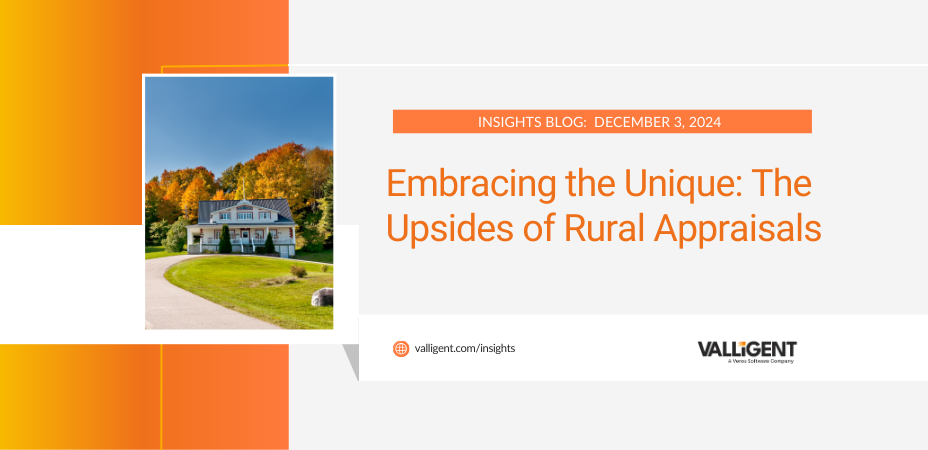Rural appraisals present a valuable opportunity for appraisers seeking to diversify their expertise and engage with an underserved market. These appraisals come with unique challenges, demanding specialized knowledge beyond standard assignments. Rural properties range from single-family housing in small communities to properties including agricultural lands, recreational sites, and large acreage. They have distinct characteristics that make them both complex and intriguing to appraise. For appraisers willing to embrace these challenges, appraising rural properties can expand one’s professional capabilities and offer critical insights in regions where market knowledge is often limited.
At Valligent, we’ve seen firsthand the advantages of developing rural expertise. Valligent’s Chief Appraiser, Jeff Hogan, explains, “Rural property appraisals call for a deeper understanding of land value, local regulations, and unique property features—factors rarely encountered in typical appraisal assignments. For appraisers aiming to broaden their skills and delve into an engaging area of valuation, rural appraisals provide a meaningful way to distinguish themselves in a more specialized sector while becoming the area expert clients seek for their rural property valuation needs.”
Key Benefits of Developing Rural Appraisal Expertise
1. Expanding Professional Opportunities
The increasing demand for professionals specializing in rural appraisals opens exciting opportunities for those in the field. A rising interest in rural living, along with the limited number of competent appraisers in many rural markets, provides a unique opportunity for an appraiser willing to invest in learning the skills of rural property valuation. By mastering these techniques, professionals can set themselves apart and tap into a robust and less crowded appraisal market, enhancing their careers and making a meaningful impact in their communities.
2. Enhancing Credibility and Compliance
Because rural property assignments often need more recent comparable sales, these reports require creative problem-solving, deep market trend analysis and often numerous adjustments. Mastering rural appraisal skills enhances an appraiser’s credibility and professionalism. Adhering to these standards reassures clients, lenders, and regulatory bodies that appraisals are conducted with integrity and meticulous attention to detail, meaning higher accuracy. By delivering high-quality valuations that inspire confidence, rural appraisers foster strong trust within the real estate community, paving the way for lasting relationships and future client opportunities.
3. Improving Client Relationships
Appraisers with expertise in rural properties offer clients valuable insights that empower them to make better decisions. Understanding key factors like land use, water sources, septic systems, outbuildings, and maintenance costs is essential for accurate rural valuations. By providing a thorough analysis and clearly communicating these important considerations, rural appraisers add significant value, helping clients see a property’s full potential while aligning its unique charm with its market value.
Hogan explains, “Rural appraisals don’t just assess a property’s market value; they’re about understanding and respecting what makes each piece of land unique. This level of insight builds trust with clients and fosters lasting professional relationships.”
Tips for Appraisers Conducting Rural Appraisals
Although rural appraisals present challenges, tackling them with the right mindset and strategies can result in smooth, accurate valuations. By adopting a proactive approach, rural appraisers can confidently navigate these complexities, uncovering valuable insights that benefit their clients. Here are a few practical tips to help appraisers thrive in rural settings:
1. Finding Comparables
Finding suitable comparables in rural areas can be challenging, but by expanding the search radius, or going back in time to review public records for land sales outside of the Multiple Listing Services (MLS), more usable data can be identified. This expanded search criteria allows appraisers to recognize potential comparables that may better reflect the market value of a rural property and ensure a more credible valuation.
Moreover, local real estate agents and brokers can also provide specific feedback about a home or comparable, which could change the entire direction of the appraisal. Agents and brokers often specialize in a property type or area, so they may have intricate details about a specific property or could have been involved with one or more prior property sales. Ultimately, they have a wealth of knowledge that can empower the appraiser to have access to all the information needed to develop a credible report.
2. Unique Property Characteristics
Many rural properties have unique valuation components such as crop income potential, livestock, or conservation easements that are difficult to quantify using standard appraisal methods. In addition, there are often outbuildings on the site (e.g., barns, silos, horse stables) that can complicate determining the highest and best use. Due to these factors, appraisers may need specialized training in identifying and valuing these features and should become comfortable using the income or cost approach, where applicable.
3. Communicating with Clients
Rural property appraisal professionals can offer valuable insights and educate clients and users of rural property valuations who may need to become more familiar with the unique aspects of these markets. Providing clear and insightful commentary in appraisal reports can enhance understanding and pave the way for smoother transactions, benefiting everyone involved.
4. Writing Compliant Reports
Finally, ensure that reports fully align with USPAP standards while clearly outlining methodologies, findings, and conclusions credibly. By addressing potential client or lender concerns with transparency and clarity, appraisers foster public trust and confidence in their valuation results.
Valligent’s Approach to Rural Appraisals
Collaborating with an experienced team can be incredibly beneficial for appraisers eager to develop rural expertise. At Valligent, our knowledgeable, professional team and advanced analytical review tools help appraisers deliver accurate and reliable appraisal reports. Our dedication to excellence in rural valuation has strengthened client relationships and created opportunities for appraisers to specialize in this rewarding market sector.
If you’re interested in learning more about best practices in rural appraisals or considering a career with Valligent, contact us! We take pride in being a reliable partner for appraisers and clients in rural and unique property markets.
For lenders seeking a dependable ally for rural and unique property valuations, Valligent is here to assist you. With extensive experience managing rural assignments, we bring specialized knowledge and a commitment to excellence to every appraisal. Contact us today to explore how our appraisal management services can cater to your specific needs.




